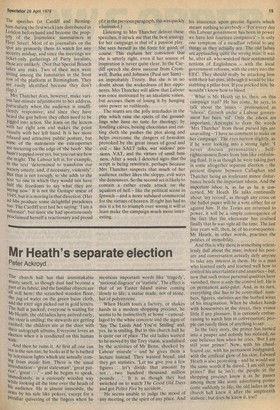Mr Heath's separate election
Peter Ackroyd
The church hall has that unmistakable Musty smell, as though dust had become a Part of its fabric, and the familiar objects are all still here: the scratched wooden floor, the jug of water on the green baize cloth, and the EXIT sign picked out in gold letters. The hall is packed; everyone is waiting for Mr Heath; the old ladies have arrived early; the vicar is smiling; the stewards are getting excited; the children are at the door with their autograph albums. Everyone loves an election when it is conducted on this human scale.
And then he ruins it. At first all one can see is the sun-tan; he looks as if he is bathed bY television lights which are actually coming from inside him. There is the usual introduction — 'great statesman', 'great pat tint', 'great. — and he begins to speak, immediately, in a curiously wooden way while looking all the time over the heads of his audience. He is almost immobile, the arms by his side like pokers, except for a Peculiar quivering of the fingers when he mentions important words like 'tragedy', 'national disgrace' or 'statistic'. The effect is that of an Easter Island statue coming slowly to life; a statue made, not of stone, but of polystyrene.
When Heath tours a factory, or shakes hands in a modem shopping precinct, he seems to be instinctively at home — camouflaged by the white concrete and the signs of 'Say The Leeds And You're Smiling' and, yes, he is smiling. But in this church hall he is quite out of place. The old ladies wanted to be moved by the Tory vision, scandalised by the activities of Mr Benn, shocked by Labour misrule — and he gives them a lecture instead. They wanted bread, and they get statistics. 'Let me give you a few figures . . . let's divide that amount by ten. . . two hundred thousand million pounds. . .'. It is as though they had switched on to watch The Good Old Days and got Police Five by accident. He seems unable to judge the mood of any meeting, or the spirit of any place. And his insistence upon, precise figures which meant nothing to anybody — Tor every day this Labour government has been in power we have lost fourteen companies' — is only one symptom of a steadfast refusal to see things as they actually are. The old ladies are applauding quite the wrong man; it was he, after all, who wrecked their sentimental notions of Englishness — with the local government reforms, with the entry into the EEC. They should really be attacking him with their hat-pins, although it would be like stabbing a pillar-box. If you pricked him, he wouldn't know how to bleed.
What is Mr Heath up to, then, on this campaign trail? He has come, he says, to talk about the issues — pronounced as Igloos'. Growth under a Labour government has been 'nil'. Only the ishoos are important. Attempts to draw the words 'Mrs Thatcher' from those pursed lips are unavailing — 'I have no comment to make on her campaign'. The eyes narrow slightly, as if he were looking into a strong light: never discuss personalities'. Selfrighteousness flows from him like embalming fluid. It is as though he were taking part in some altogether separate election — the present dispute between Callaghan and Thatcher being an irrelevant minor disturbance beside the important ishoos. And the important ishoo is, as far as he is concerned, Mr Heath. He talks continually about 'my 'record', as though any cross on the ballot paper will be a vote either for or against him. If the Tories are returned to power, it will be a simple consequence of the fact that the electorate has realised finally that he was right all the time. The last four years will, then, be of no consequence. Mr Heath, in other words, practises the politics of immobility.
And this is why there is something relentlessly dull about the man; indeed his posture and conversation actually defy anyone to take any interest in them. He is a man who learned early and learned well how to control his uncertainties and anxieties — but, now that such minor personal qualities have vanished, there is only the control left. He is on permanent auto-pilot. And, in its turn, everything else has to be controlled: numbers, figures, statistics are the barbed wires of his imagination. When he shakes hands with housewives in the street, they evince little if any pleasure. It is curiously embarrassing to watch him in conversation; people can rarely think of anything to say. In the fairy story, the prince has turned into a pauper and nobody has noticed; no one believes him when he cries, 'But I am still your prince!' Now, with his chauffeured car, with his permanent bodyguard, with the artificial glow of his skin, Edward Heath is also protesting — and he would use the same words if he dared. am still your prince!' But he isn't; the people in the shopping precinct know it as he passes among them like some advertising poster come suddenly to life; the old ladies in the church hall knew it after the umpteenth statistic; but does he know it, too?






































 Previous page
Previous page